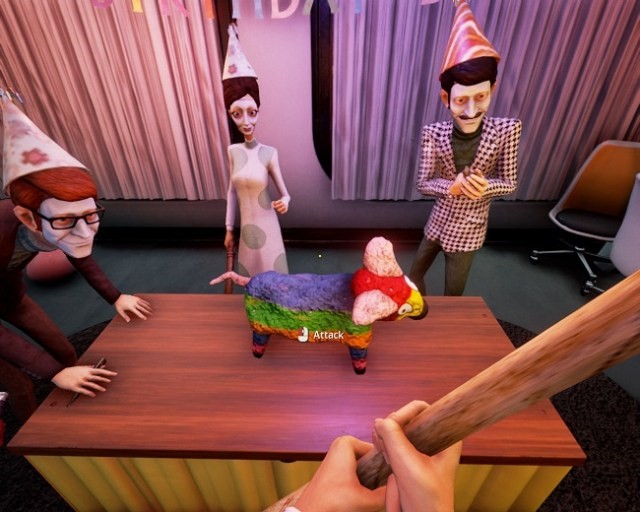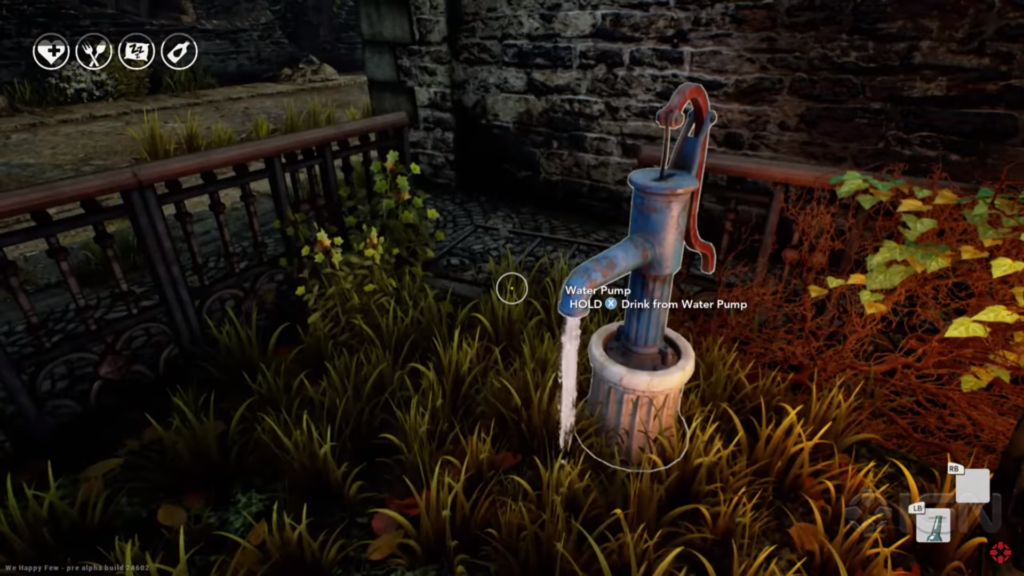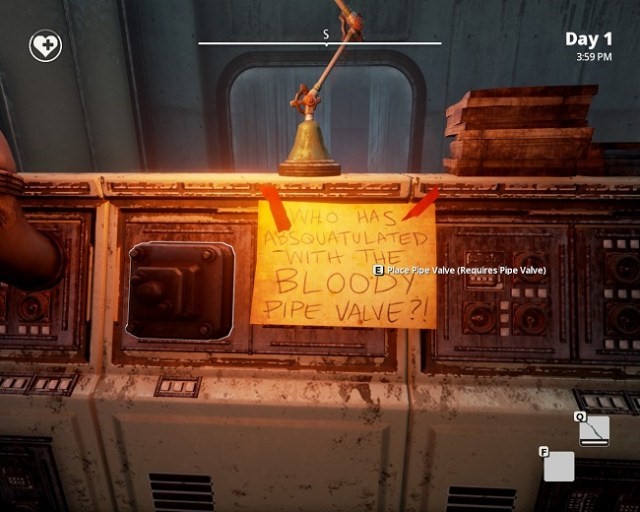Disclaimer: This preview is based on an Early Access version of We Happy Few, not the finished product. An access code was provided by the publisher.
Not since the original Bioshock have I been as excited about a game as I was about We Happy Few, the retrofuturistic open-world survival game from indie studio Compulsion Games. Like Bioshock, it is set in yesterday’s vision of the future, but rather than Rapture’s Art Deco grandeur we are given Wellington Wells, an English town with its feet firmly planted in the British dystopian science fiction of 1984, A Clockwork Orange, Brazil, and A Brave New World.
The Early Access version of We Happy Few opens with the game’s full prologue. You play as Arthur Hastings, 1964’s Employee of the Year at Wellington Wells’ Department of Archives, Recycling, and Printing. Your job is to check old records and either approve or censor them – simple enough, but also an early sign of the totalitarian nature of the city’s government. When Arthur is presented with a news clip about his brother, painful memories begin to surface. He throws away his Joy, a hallucinogenic antidepressant that everyone is required to take by law, and ends up on the run, chased by murderous ex-colleagues.
The opening is perfect, presenting an intriguing world full of satirical intent and some great dark humour. It looks and sounds great, and is full of intriguing ideas and concepts. The effects of Joy are particularly interesting, with Arthur’s perception of the world changing as he comes off the drug. The most memorable moment is when an office-party “piñata” turns out to be a giant rat, and Arthur’s Joyed-up colleagues feast on its spilled innards thinking they’re eating sweets. I was left eager to throw myself into We Happy Few and discover what happens to Arthur, his brother, and the city.
However, the rest of the Early Access content left me feeling rather cold.

Credit: Compulsion Games.
You start in the city’s garden district amongst all the other “Downers,” citizens who have come off of their Joy and are leading horrible, miserable lives fueled by rotten vegetables and alcohol. The only goal is to escape; to do so, you must find ways to cross bridges to other parts of the city, scavenge for supplies, and not starve to death or die of thirst on the way. The world is procedurally-generated, meaning items, quests, and important locations are randomised with each new game.
This is a blessing and a curse. Arthur needs to eat, drink, and rest in order to stay alive, but at a far greater rate than in real life (he’ll starve to death in about a day) which means survival takes a front seat and pushes progression through missions to the side. Random generation means it can be very hard to find the resources or items you need to either survive or craft the tools required to progress in the game. Add to this the occasional failure of the game to place quest markers or to offer you much in the way of guidance and We Happy Few becomes frustrating, fast. Hopefully the Early Access process can iron some of these problems out.

Credit: Compulsion Games.
These kind of open-world, procedurally-generated, survival and crafting games are ten-a-penny at the moment, whether they’re aimed at kids (Minecraft), are full of zombies (DayZ), or feature space explorations (No Man’s Sky). To stand out in that packed market a game needs to be exceptional, and so far We Happy Few’s gameplay just isn’t. The game’s biggest strengths, the things that make it stand out, are its dystopic Orwellian setting, the humour and darkness of its world, and the stories that could take place there. The generic, run-of-the-mill and slightly buggy gameplay just doesn’t seem to mesh with the unique, chaotic promise of the trailers, and running around searching for food and water feels like it could be happening anywhere.
This doesn’t mean that the open-world sections are completely devoid of character – as a lover of literature I really enjoyed spotting all the literary references that pepper the game, from Shakespeare to Eliot, Yeats to The Wicker Man. It shares a lot in common with Bioshock but rather than exploring a messed-up city after it’s fallen apart it allows you to inhabit the dystopia firsthand, which is a much more interesting proposition. But for every moment in We Happy Few that delighted me with its dark writing or quirky characterisation, I spent so many long minutes aimlessly searching for food or water that might not even be there, or trying desperately to remember where a key objective was because the game won’t tell me.

Credit: Compulsion Games.
So, should you dive in right now and grab the Early Access version of We Happy Few? Well, no – unless you are the kind of person that craves a peek into the creative process or wants to be actively involved in providing feedback, you will probably find the current build buggy, frustrating, and devoid of purpose. But should you keep an eye on it? Definitely. Compulsion Games have deliberately kept the Early Access story-free, so that the plot isn’t spoiled, and the prologue and incidental characters, scripted lines and readable items scattered across the world point to a team that can write, and write well. If they can tighten the survival gameplay and provide a solid story to bring Wellington Wells to life, they may just have a hit on their hands. The foundations are there but for the moment, We Happy Few is a frustrating example of wasted potential.